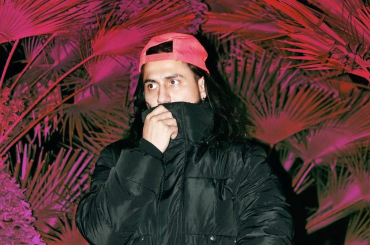Whether you’re a longtime clubber or a relatively recent convert to the EDM-fueled festival scene, there is no denying the impact that French DJ/producers have played in electronic music’s rich history.
If you didn’t know already, the list of legendary musical exports is a long one, and it includes Daft Punk, Laurent Garnier, Bob Sinclar, David Guetta, Martin Solveig, Cedric Gervais, and Gesaffelstein. And don’t forget the French-born/NYC-based François Kevorkian, whose contributions to the music and industry overall are as deep as it gets.
But, even with such an impressive list still going strong, it has been the Pardon My French collective (DJ Snake, Tchami, Malaa, and Mercer) that has been dominating the global festival circuit in recent years. A quartet of lifelong friends, each boasting their own unique personalities, the DJ/producers have all made their individual marks to varying degrees of success, with DJ Snake certainly riding the loftiest heights in the pop culture.
But Tchami’s not far behind. Not only have his spiritual aura and clerical collar helped separate himself from the traditional DJ mold, his musical output has helped define what we’ve come to know as “future house.”
Born Martin Joseph Léonard Bresso in Paris, Tchami’s musical journey began at the age of four with classical training playing a significant role in his development. As a teenager, he befriended one William Sami Étienne Grigahcine (aka DJ Snake) and the pair would become quite the cratediggers, quickly entrenching themselves in the world of electronic-dance music.
Tchami popped onto the scene back in 2013 with a remix of “Go Deep” by Janet Jackson, followed up by his two- track Promesses EP on A-Trak’s esteemed Fools Gold Records. Making waves out of the gate with a refreshing style of production (he coined the term “future house”), Bresso delivered a modern-day makeover to classic house music, while serving up hard-hitting tunes that were festival-friendly. At the same time, Tchami was a part of the production of DJ Snake and Lil Jon’s 2013 trap anthem “Turn Down for What” which took the world by storm.
Fast-forward to 2015: Tchami launched his very own record label, Confession, a platform for rising producers to continue to push the traditional boundaries of house music, while helping them get their music heard. That same year, the French talent would release his After Life EP, which dominating the blogosphere, officially catapulting him into the spotlight.
Since then, Tchami has made the rounds across the globe, bringing his spiritual presence to iconic clubs and festivals, boasting a discography that includes “Prophecy” (alongside the masked mastermind Malaa), his blissful beauty “Adieu” and his recent Revelations EP.
In 2020, following a steady flow of singles, Tchami looked to take that next step. Not only did he see his collaborations with Lady Gaga find their release on her Chromatica album, he prepped his debut album for release. But as he finished what became Year Zero, it became apparent that the global pandemic would have its say about the proceedings.
Consequently, with a headlining tour and major festival dates cancelled, Tchami – like other global talents looking for a big 2020 – had to imagine what could’ve been in a year gone wrong. Despite the challenges, the Miami- based Tchami has given us a terrific album, so he took the time to connect with DJ Times to discuss his journey and reflect on a very strange year personally and professionally.
DJ Times: What got you started DJing? Was there a DJ that influenced you in the beginning?
Tchami: I think the first DJs that influenced me were guys like Cut Killer, A-Trak, DJ Premier. It was the end of the ’90s.
DJ Times: What was your first DJ set-up? Did you start with vinyl?
Tchami: Yes, I had two BSTs PR-90 belt-drive turntables and a Gemini PS-626 three-channel DJ mixer.
DJ Times: At what point did you become comfortable DJing in front of a crowd? Is there a story?
Tchami: It was when I started touring as Tchami. I already had experienced small crowds earlier, but this always was a challenge to overcome. With Tchami, I had no choice – I had to make it work.
DJ Times: What kinds of clubs were you going to?
Tchami: I was not into partying in clubs. I only went when the DJ was a friend and I wanted to listen to his set
and maybe be allowed to play at the end of the night.
DJ Times: What DJ gear do you require in the booth now? Why do you choose this platform?
Tchami: These days, I use the classic Pioneer DJ CDJ-2000NXS2 media players with the Pioneer DJ DJM-900NXS2 mixer. I’m comfortable with these and they are very reliable.
DJ Times: Which DJs impress you now and why?
Tchami: Recently, I enjoy Floating Points for the crate digging and his selection of songs.
DJ Times: From Laurent Garnier to Daft Punk and David Guetta to your Pardon My French collective, Paris has always seemed to have a vibrant DJ scene, but one very different from the other European countries. Any reason for that? Did your countrymen hold most of the influence on up-and-coming French DJs? Or did the French DJs look to other places for inspiration?
Tchami: As I like to think, we have our own way of absorbing different cultures in France. Most of the time, there is a genuine approach in this process. Long story short, we may want to do it exactly like the originators, but we always end up making our own blend and trying to create something else with respect to where the inspiration came from. I think we study the music a lot. Maybe this is what makes French music a bit special or, at least, sets it apart from others.
DJ Times: You moved to the United States a few years ago – what’s it been like for you, culturally and musically? Likes/dislikes, compared to Europe?
Tchami: It’s a cultural shock in the business field. As for music, the United States has the best infrastructure. People are prompted to discover new genres and they are more on-board with innovation. The U.K. has that, too. They always have been in a special creative place, aside from the world and defining countless trends.
DJ Times: Your clerical theme/clothes… what was the origin of that? Have you run into any trouble with it?
Tchami: No trouble at all. This is a visual artifact that tends to spread a message of unity through the music I make and play. Music is pure energy. You either feel it or not.
DJ Times: What is it about house music that made you fall in love with the genre?
Tchami: I was producing for artists at the time – I was more like a beatmaker. I was frustrated about all these beats sitting in my computer with little result. I saw [the late] DJ Mehdi, who was on my radar as a hip-hop producer, make a move towards electronic music. He made history in the French electronic-music space being at the forefront of labels like Ed Banger. He showed me that I could evolve. And that’s what I’ve been doing ever since. This was a pivotal moment, for sure.
DJ Times: What was so appealing about the genre that you wanted to produce it yourself?
Tchami: The freedom. The control of your music. I was not going to have to answer to anyone else, but myself. More freedom and, so, more responsibilities. I didn’t know it at the time, but I needed that.
DJ Times: How have you spent your time in lockdown? You were in the midst of your “Elevation” tour when the coronavirus pandemic caused the shutdown of the country.
Tchami: Yes, the pandemic hit me hard, as I had to cancel half of the “Elevation” tour shows. But it also made me realize that I needed some time home to figure some important things out. I’ve been struggling to create the first two or three months, but the summer gave me some good vibes to write about. My mind needed some rest, apparently. The good thing was that I had my album nearly done and some other music for other projects, as well. That gave me some air, for sure.
DJ Times: What was it like for you to release an album during all this coronavirus chaos? Was there any silver lining to it?
Tchami: It’s been challenging, but I think the world needs music – and art, in general – more than ever. Don’t be afraid to put out some great songs just because, due to the pandemic, you can’t promote them on tour now. People need the music.
DJ Times: You’ve released plenty of tracks over the years, but Year Zero is your debut album. What was the process like putting a complete studio album together?
Tchami: It was a long journey. One day, I came across a dozen unfinished tracks and demos, and I thought it could be the backbone of an album, if I wanted. I wasn’t ready, but the idea never left me. At some point, I went through a bit of a creative block and realized that I needed a new challenge. The idea of the album came back to me and I started to work on more songs. Then, we started the songwriting process mostly in Los Angeles and London with amazing artists that helped me complete my vision. The album was definitely a co-creation.
DJ Times: How would you say your sound has evolved since your earliest releases compared to Year Zero?
Tchami: I honestly don’t know. I don’t like analyzing my work. I just do what I like in the moment. Then I work on the music until I feel it’s the way it’s supposed to be.
DJ Times: When it comes to production for this album, where did you find inspiration?
Tchami: In my past, my vinyl crates, my all-time classics and my experiences as a young music lover and explorer. It’s not a tribute, but I dug up some of my best musical
moments and translated them into new sounds. That’s what Year Zero is about. A new beginning based on what was already good.
DJ Times: Not only does 2020 see the release of your debut album, but you also co-produced a few tracks on Lady Gaga’s recent album, Chromatica, including “Rain On Me” with Ariana Grande. How did you get involved with that project and what’s it like working with a superstar like Lady Gaga?
Tchami: It has been an amazing time spent with her and her team. First, [producer/songwriter] BloodPop came to me and asked me to come to Los Angeles to hear the music and maybe work on it. I think what makes the album so rich is that they were not afraid to let all their collaborators touch each and every song. They had a vision, for sure, but they let me do what felt right for the record. To me, that’s the best attitude when you try to convey something unique.
DJ Times: Speaking of producing, what gear and programs do you use? For example, what’s your DAW?
Tchami: I currently use Ableton Live. I started on [Sonic Foundry] ACID Pro 3.0, then [Steinberg] Cubase SX, then [Propellerhead] Reason. For now, I stick with Ableton Live 10.
DJ Times: Is there a studio product that you’re especially loving now – a plug-in or vintage synth – that helps you get unique sounds?
Tchami: I love u-he Diva as a VST [analog] synth. I love all the DMGAudio suites. They’re very versatile and tweakable, if you want to do that.
DJ Times: Do you have a favorite track from your album?
Tchami: I honestly don’t have a favorite. I love them all – they all mean a different thing to me.
DJ Times: When your album gets released, will you be taking a break? Or are you headed right back into the studio?
Tchami: Those six months were the break I didn’t know I needed. Now I’m in a great shape creatively, so we’ll see what happens next. Whether it is music for me or for others, there is so much room – and I love it.
To check out more interviews, click here.
DJ Times Magazine is copyright © 2020 by DJ Publishing, Inc. www.djtimes.com








